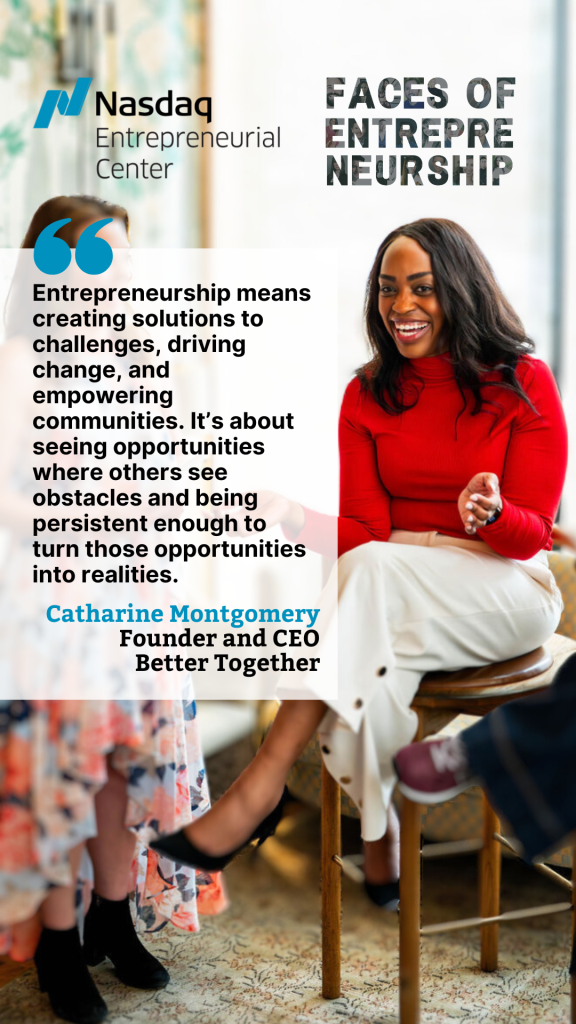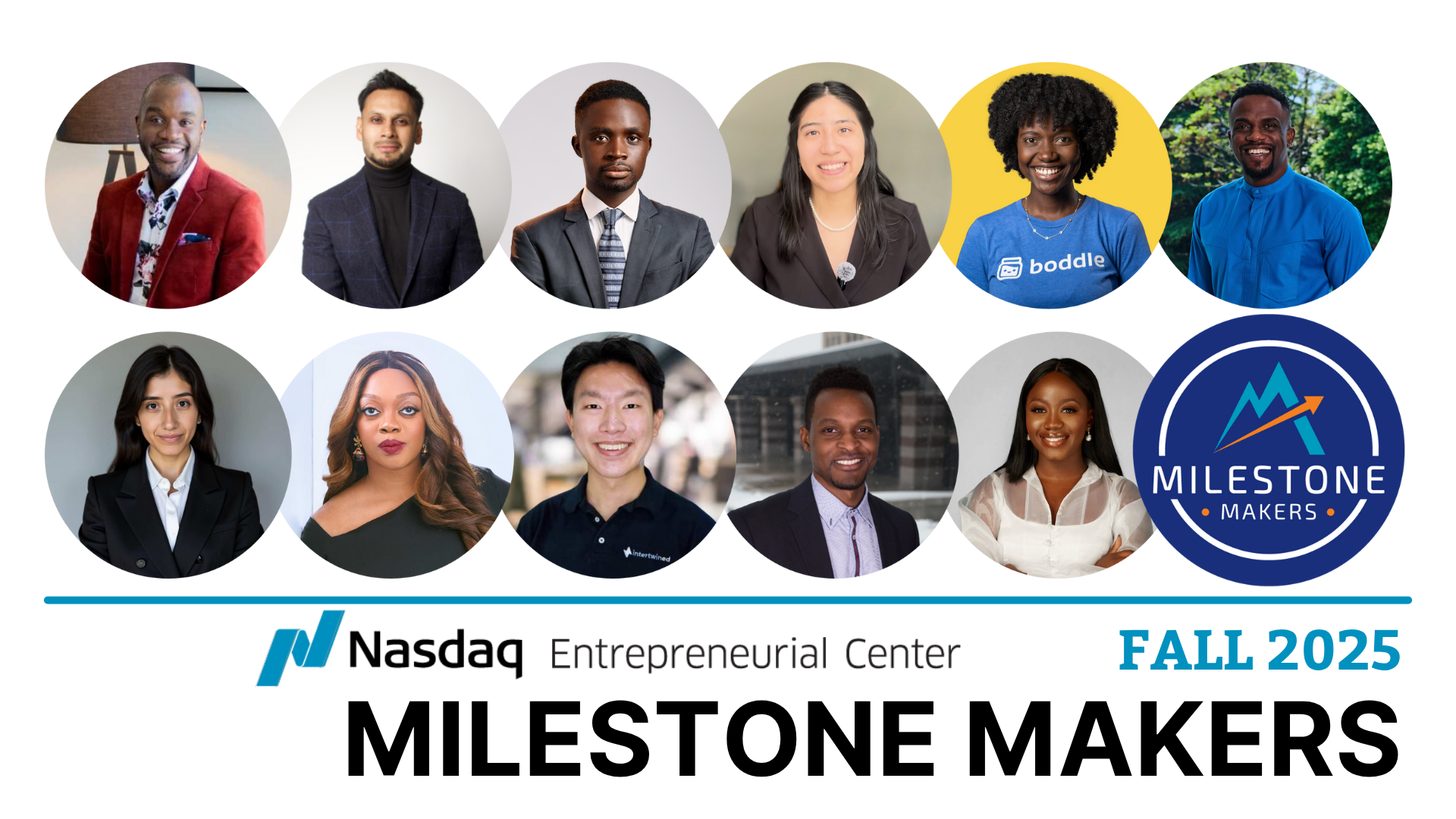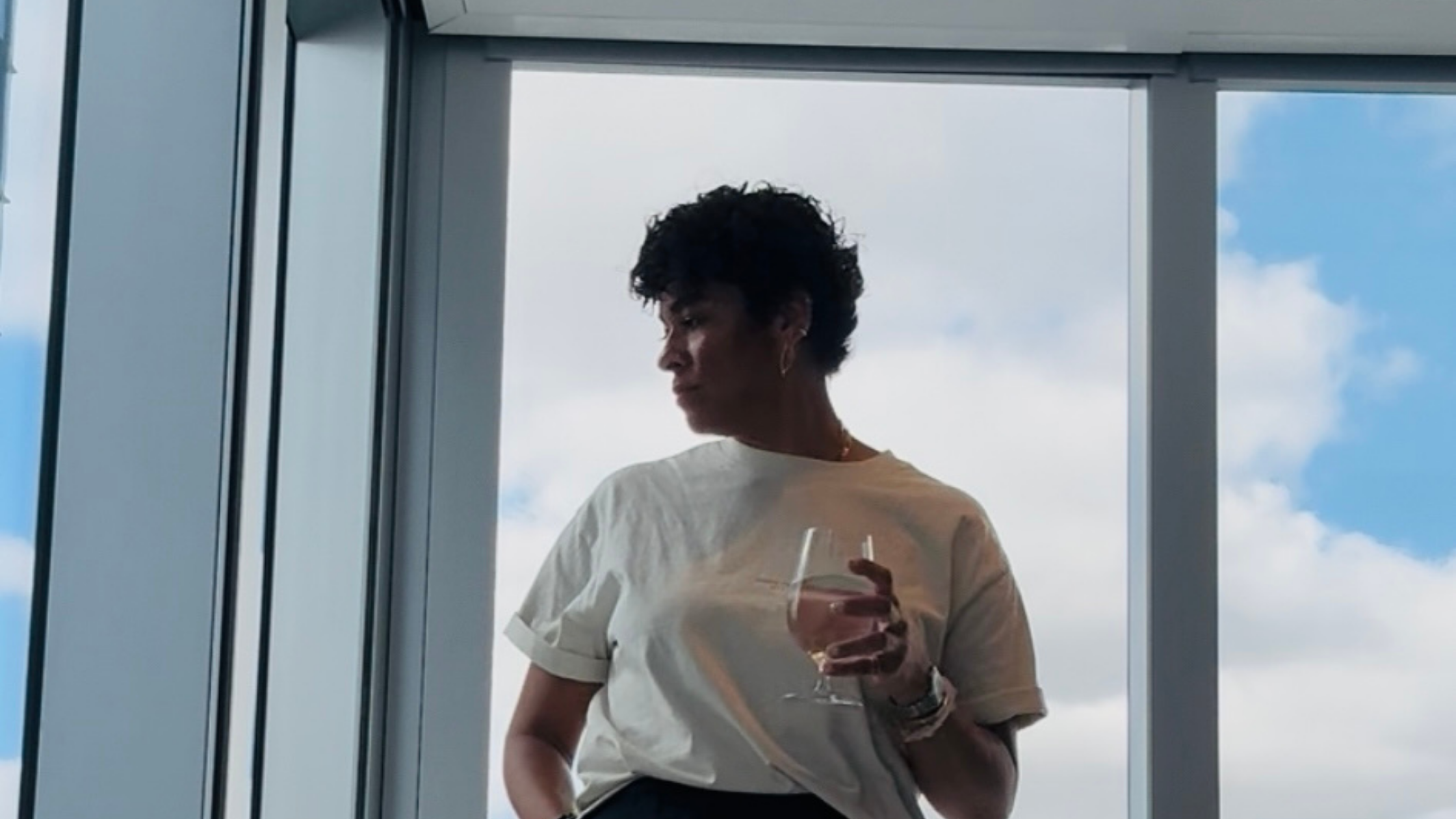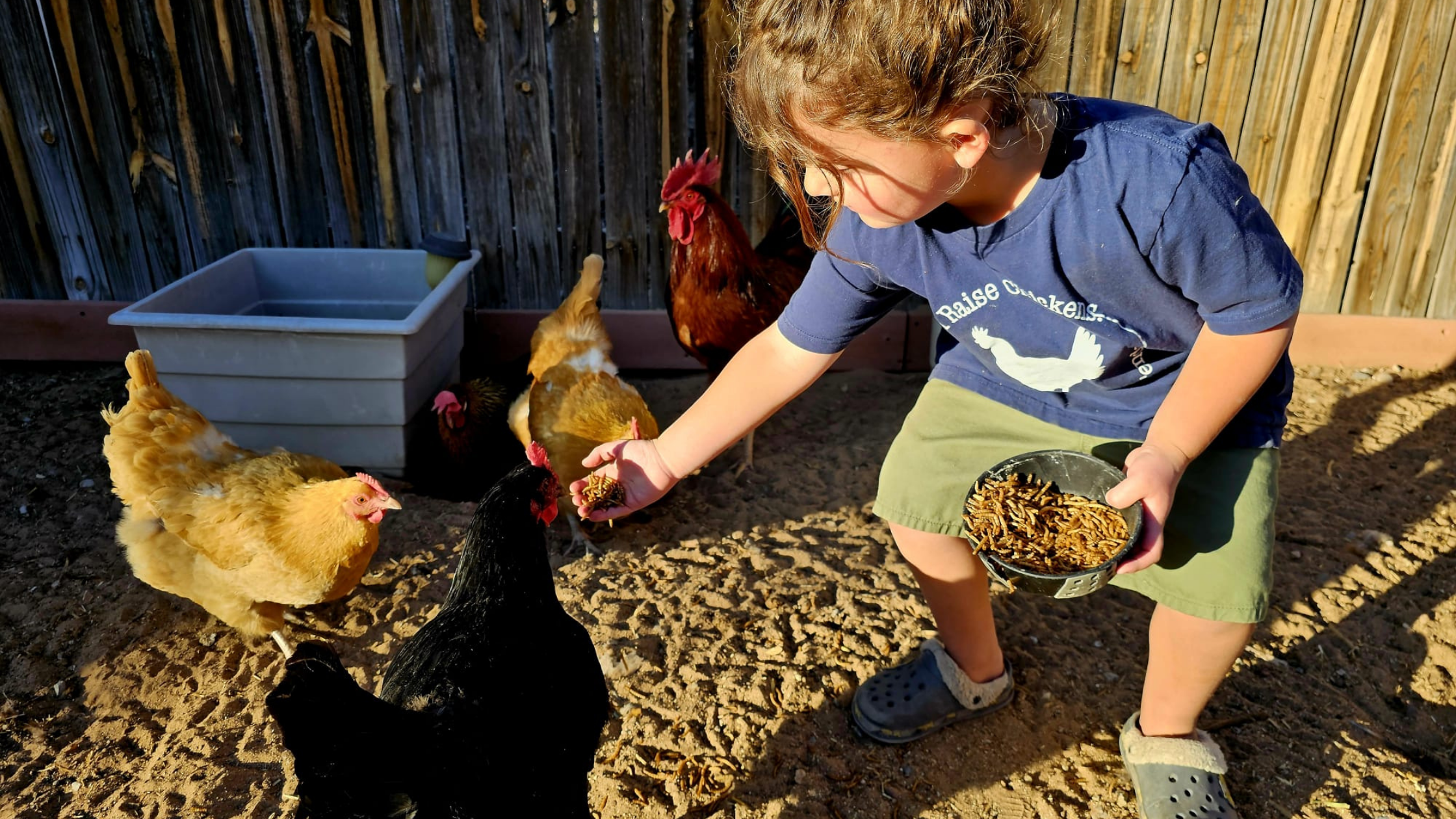Catharine Montgomery is the Founder and CEO of Better Together, a purpose-driven communications agency that partners with organizations working toward social impact and justice. Her passion for human rights, education, and healthcare fuels her mission to create meaningful change through strategic branding and messaging. With extensive expertise in social justice and environmental advocacy, Catharine has built a reputation for leading campaigns that resonate deeply with communities and drive tangible outcomes. Her journey into entrepreneurship was inspired by her personal experiences confronting systemic racism, which motivated her to build a space where equity, inclusion, and purpose-driven communication could thrive. Through Better Together, she continues to amplify underrepresented voices and champion causes that promote a more just and sustainable world.
What does “entrepreneurship” mean to you?
 Catharine Montgomery: Based on my experience, entrepreneurship means creating solutions to challenges, driving change and empowering communities. It’s about having the courage to take risks and the resilience to navigate setbacks. It’s also about seeing opportunities where others see obstacles and being persistent enough to turn those opportunities into realities. Learning from the bad and turning it into good is my mantra.
Catharine Montgomery: Based on my experience, entrepreneurship means creating solutions to challenges, driving change and empowering communities. It’s about having the courage to take risks and the resilience to navigate setbacks. It’s also about seeing opportunities where others see obstacles and being persistent enough to turn those opportunities into realities. Learning from the bad and turning it into good is my mantra.
Tell us about your first experience with entrepreneurship.
CM: My first experience with entrepreneurship was starting a small PR consultancy – my journey as a solopreneur – while I was still working full-time. I wanted to help small businesses tell their stories and reach broader audiences. This experience taught me the importance of balancing vision with practical steps and the value of building strong relationships. It was challenging managing both roles, but it laid the groundwork for my future endeavors with Better Together.
What is your company’s origin story? What is the biggest reason you started your business? What did those early days look like and teach you?
CM: Better Together was born from a personal encounter with systemic racism in my previous job. Facing racism and witnessing the lack of accountability within the organization pushed me to fight for a buyout and subsequently start my own venture. I wanted to create a space where purpose-driven communication could thrive and where inclusivity, equity, and social justice were the cornerstones.
In the early days (18 months ago), it was just me, working out of my home office, driven by a mission to support organizations that aim to make a positive impact. I leveraged my network, reached out to potential clients, and slowly built a team that shared my vision. Those early days were tough but incredibly rewarding. They taught me the value of resilience, the importance of staying true to one’s mission, and the power of a supportive community. Starting Better Together was about more than just creating a business; it was about building a platform that could amplify marginalized voices and drive meaningful social change.
What do you wish you knew when you started? Is there anything you would do differently?
CM: I wish I knew the importance of building a strong support network early on. If I could do it differently, I’d invest more time in mentorship and strategic partnerships from the start. Understanding the value of having mentors who can provide guidance and perspective would have accelerated our growth and helped avoid some pitfalls.
What does “success” look like for you? We’d love to hear your biggest, boldest dream. What do you think will help you achieve it?
CM: Success is creating lasting positive change in communities and seeing our clients thrive. My boldest dream is to expand globally, influencing social justice communications worldwide. Building a dedicated, passionate team and fostering strong partnerships will help achieve this. Success for me also means creating a workplace where my team feels valued and empowered to make a difference. One key milestone would be launching initiatives that resonate on a local level and have a global impact, leveraging technology, such as AI, and innovative strategies that allow us to reach diverse audiences.
What is your superpower as an entrepreneur? What is your proudest and darkest moment so far? Share a key high and a key low from your journey if you can.
CM: My superpower is my ability to connect with people and understand their stories. This empathy allows me to create authentic and impactful campaigns. My proudest moment was securing venture capital backing as a Black woman entrepreneur, breaking barriers in a predominantly white male-dominated field. The darkest moment was leaving a toxic work environment, which challenged my mental health but ultimately taught me the importance of resilience and self-care. A key highlight was our successful campaign for the National Coalition for Sexual Health, which made a significant impact on young adults’ understanding of healthy relationships. A key low was losing a major client early on, which forced us to reassess and improve our strategies.
What are your personal driving principles, your top values?
CM: Integrity, empathy and commitment to social justice are my core values. They drive every decision I make, ensuring our work aligns with our mission to use communications to achieve equity. I believe in being transparent with our clients, standing up for what is right and continuously striving to create a more equitable world.
How have your personal principles and values shaped your company’s values and principles? Give us some examples.
CM: My values have shaped Better Together’s commitment to transparency and inclusivity. For instance, we only take on clients whose missions align with our values of social justice and equity. This means turning down lucrative opportunities if they don’t meet our ethical standards. Another example is our internal culture; we prioritize diversity and inclusion in our hiring practices and foster a workplace where every team member feels valued and heard. Our work with the SEIU on promoting racial justice within corporate governance is a direct reflection of these values.
What’s it like to work alone or with your partners?
CM: Working with partners brings diverse perspectives and strengths, enhancing our projects. Collaboration fuels creativity and ensures we cover all angles in our strategies. It also provides a support system, which is invaluable in navigating the challenges of entrepreneurship. The synergy of working with a team that shares your vision can lead to innovative solutions and more effective campaigns. Working alone means that I only have my perspective when it comes to campaigns. It can also amplify any unconscious biases I may have. By working with others, I am held accountable for ensuring our campaigns are equitable.
What role does mentorship play in your world (as a mentor or mentee)? Tell us about what makes mentorship valuable to you and your business.
CM: Mentorship is invaluable. As a mentee, it provides guidance and perspective, helping me avoid common pitfalls and make informed decisions. As a mentor, I give back and support the next generation of leaders. Both roles are crucial for growth and learning. Mentorship has played a key role in our success, from refining business strategies to navigating complex challenges. It’s also a way to build a network of support and continuously learn from others’ experiences. I have joined numerous organizations to learn as much as I can from others who are successful in their business ventures from Chief and LinkedUnite to Dreamers & Doers and the National Urban League.
Can you share some insights into the market or industry you operate in? How have you navigated challenges and changes in the market landscape?
CM: The communications industry is constantly evolving, with generative AI being one of the most significant recent developments. AI is transforming how we create content, analyze data and engage with audiences. At Better Together, we’ve embraced these changes by integrating AI tools into our workflows, allowing us to deliver more personalized and impactful campaigns.
One of the biggest challenges is ensuring that our use of AI aligns with our commitment to authenticity and social justice. We navigate this by maintaining a human touch in all our interactions and using AI to enhance, not replace our storytelling abilities. By staying adaptable and continuously learning, we’ve been able to leverage these advancements to better serve our clients and create more meaningful connections with their audiences. This approach has allowed us to stay ahead of industry trends and continue to innovate in our strategies.
Many entrepreneurs continue to perfect their daily routines to support their work and greater vision; would you mind sharing your morning routine or a regular ritual that grounds your work each day?
CM: Every morning, I start my day by using my standing desk and walking treadmill. This routine helps me stay active and energized, even when I have a packed schedule. After a good walk, I review my goals for the day, set priorities, and take a few moments for reflection or meditation. This combination of physical activity and focused planning helps me stay grounded and ready to tackle the day’s challenges.
How do you manage the work-life balance as an entrepreneur? What strategies have you found effective in maintaining your well-being?
CM: Scheduling dedicated personal time and setting boundaries is key. Regular exercise, planning vacations, and finding moments of joy, like listening to podcasts, help maintain balance. I also make sure to disconnect from work during weekends and evenings to recharge. It’s essential to prioritize self-care and make time for activities that bring joy and relaxation. For example, I schedule regular check-ins with my team to ensure they are also maintaining a healthy work-life balance, fostering a supportive and understanding work environment. I also spontaneously gave my employees the Friday after the 4th of July off, and I took a solo trip to Turks and Caicos.
Where do you turn for inspiration?
CM: I find inspiration in the stories of those who have overcome adversity and made significant impacts. Books, podcasts, and conversations with mentors also provide valuable insights and motivation. I’m inspired by leaders like Sheila Johnson, who have paved the way for women and minorities in business. Their journeys remind me that perseverance and dedication can lead to incredible achievements.
Building and sustaining a business often involves overcoming various challenges. Can you share a specific moment where your entrepreneurial resilience was tested, and how did you navigate through it to ensure the sustainability of your business? What lessons did you learn from that experience?
CM: One of the most challenging moments in my entrepreneurial journey was confronting the racism and systemic biases in my previous workplace. This experience tested my resilience and forced me to make a difficult decision: either stay and endure or leave and carve my path. I chose the latter, which led to the creation of Better Together. Starting from scratch, I had to build everything from the ground up with limited resources and against significant odds.
In the early days, we faced the challenge of establishing credibility and attracting clients who aligned with our values. To navigate this, I focused on building a diverse client base that included organizations committed to social impact. We tailored our value proposition to emphasize our unique strengths in strategic communications and our dedication to social justice.
Through persistent networking, leveraging my personal experiences, and demonstrating our commitment to driving meaningful change, we gradually gained traction. This journey taught me the importance of staying true to my values, being flexible in my approach, and continuously improving our strategies. It reinforced the idea that resilience is not just about enduring hardships but also about finding opportunities within challenges and using them to fuel growth and innovation.
Do you have a favorite quote, mantra, or words of wisdom to get through the tough days?
CM: I draw strength from the words of Angela Davis: “You have to act as if it were possible to radically transform the world. And you have to do it all the time.” This quote reminds me to stay committed and persistent in my efforts to drive change, no matter how challenging the journey may be.
John Lewis also provides wisdom that resonates deeply with me: “Take a long, hard look down the road you will have to travel once you have made a commitment to work for change. Know that this transformation will not happen right away. Change often takes time. It rarely happens all at once.” These words help me stay patient and focused on the long-term impact, understanding that meaningful change requires sustained effort and dedication.
What is a problem that keeps you up at night?
CM: The ongoing racial wealth gap and how we can effectively contribute to closing it through our work in communications. I constantly think about how we can use our platform to drive meaningful change and support marginalized communities. It’s a complex issue that requires systemic change, and I’m committed to finding ways to make a positive impact through our campaigns and initiatives.
How do you think about helping others through your work?
CM: Helping others is the core of Better Together’s mission. We focus on amplifying voices that are often unheard and driving social change through effective communication strategies. For example, we have worked with organizations advocating for healthcare equity and environmental justice, ensuring their messages reach the right audiences. By partnering with these organizations, we help them build stronger communities and create lasting impact. It’s about using our skills and resources to empower others to make a difference.
Have you faced any significant crises in your business, and how did you manage and overcome them?
CM: One significant crisis we faced was dealing with systemic racism in the industry and within our own previous experiences. This wasn’t just a personal challenge but a professional one that affected our operations and our team’s morale. To manage this, we took a firm stand against any form of discrimination and made it a core value of Better Together to promote inclusivity and equity in all our practices.
We also faced a crisis when trying to secure initial clients who shared our commitment to social justice. Many potential clients were hesitant to invest in a new agency focused on these values. To overcome this, we leveraged our personal networks, highlighted our unique value proposition, and showcased our dedication to making a positive impact. We also emphasized the importance of authentic storytelling and transparent communication, which resonated with our target audience.
By staying true to our mission and continuously advocating for our values, we were able to build a loyal client base that believes in our vision. This experience taught us the importance of resilience, adaptability, and unwavering commitment to our principles. It reinforced our belief that facing challenges head-on with integrity and purpose can lead to greater strength and success.
What advice do you have for fellow (and aspiring) entrepreneurs building and leading teams?
CM: Invest in building strong relationships with your team members. Understand what motivates them and create an environment where they feel valued and empowered. Leverage intrinsic motivation by aligning their work with their values and goals. Encourage open communication and collaboration, and provide opportunities for professional growth. Remember, a motivated and engaged team is key to achieving your vision.
Additionally, ensure you have strong managers in place who are aligned with your vision and mission. Good managers are crucial for carrying out the organization’s goals at every level. They help translate the broader strategy into actionable tasks and support their teams in achieving them. By having effective managers, you create a cohesive and unified approach to achieving your mission, ensuring that every team member is working toward the same goals and that the organization’s values are upheld in every project and interaction.
What kind of an entrepreneur do you want to be known as – as in, what do you want your legacy to be?
CM: I want to be known as an entrepreneur who made a significant positive impact on society, championing social justice and empowering others to achieve their full potential. My legacy would be creating a business that not only thrives but also drives meaningful change, inspiring future generations to continue the work of making the world a more equitable and just place.
.
Do you have someone you’d like to nominate to be profiled in our Faces of Entrepreneurship series? Please let us know by emailing media@thecenter.nasdaq.org or submitting your nomination using this form.




